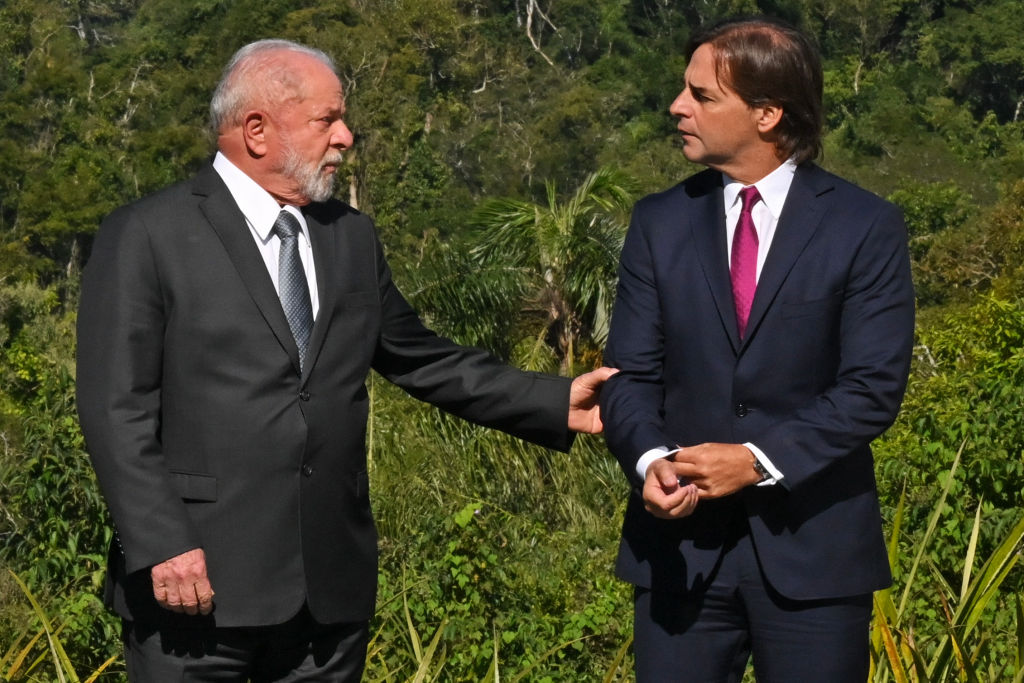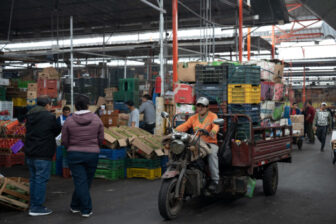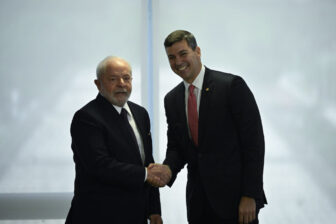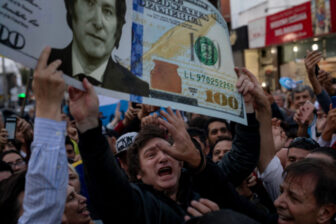BUENOS AIRES—The fate of Mercosur is perched on a razor’s edge. The next few months will be critical for the three-decade-old South American trade bloc, which has struggled to preserve strong support among its four member states, which are increasingly divided by political issues, a failure to deepen collaboration and the desire to pursue individual international trade agreements.
Argentina’s presidential frontrunner, libertarian Javier Milei, has promised to withdraw his country from the bloc altogether if he wins the presidency later this year. That would be a debilitating blow for the group. Although it’s uncertain whether Milei would follow through on this pledge, it is a clear indicator of the scale of the threats to Mercosur.
Uruguayan President Luis Lacalle Pou has been impatient with Mercosur for years, and has sought to pursue bilateral trade agreements, in violation of the trade bloc’s protocol, which insists trade deals be struck in concert with other bloc members. A tiff over tolls charged by Argentina on waterways, and Brazil’s new efforts to limit milk imports showcase the kind of low-level friction that is undermining the foundational promise of a customs union that originally sought to emulate the European Union.
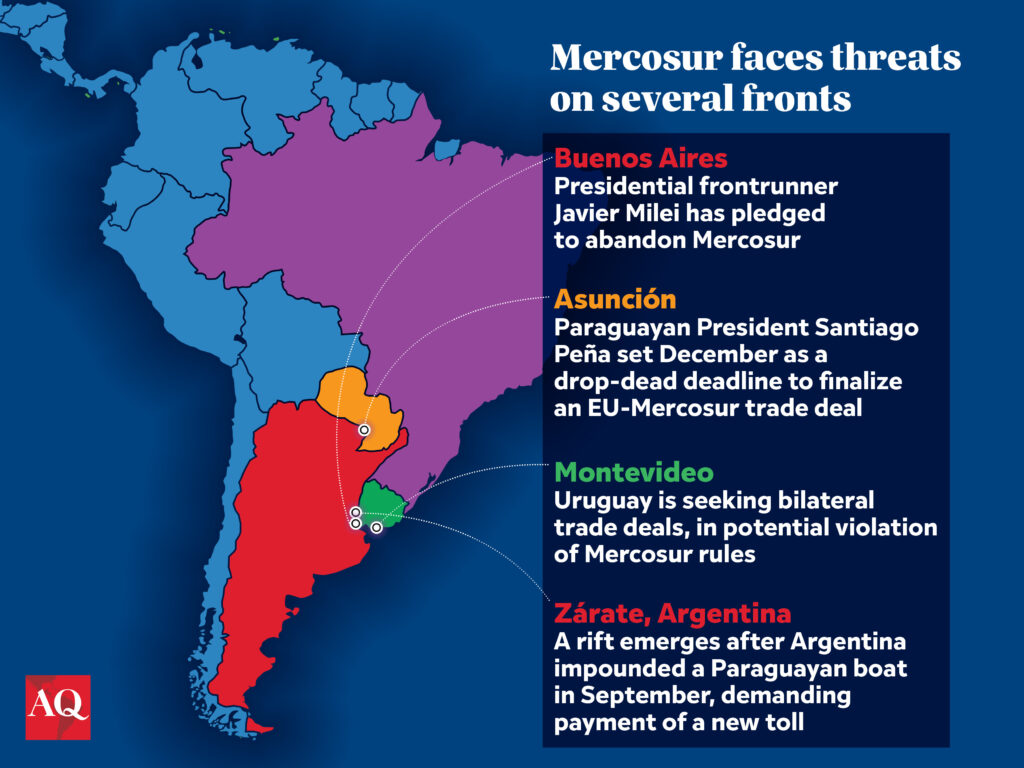
A major deal in peril
A long-stalled free trade agreement with the European Union could be a game-changer for the tarnished trade union, providing tangible economic benefits that would quiet critical voices within. Under the agreement, Mercosur’s trade pacts would encompass economies worth 30% of global GDP, up from the current 9%. Further, it could bolster the multipolar geopolitical ambitions of Brazilian President Luiz Inácio Lula da Silva and allies. In addition to trade, the agreement seeks to bolster political and strategic cooperation between the two sides.
But the deal’s shelf life is close to expiring after agonizingly drawn-out proceedings. Inked in 2019—after 20 years of negotiations—it must be finalized by the December or be scuttled, said Paraguayan President Santiago Peña, who will assume the bloc’s rotating presidency on December 6. “Either we close by December 6 or we don’t close,” Peña told the Financial Times.
The international diplomatic context is as favorable for the EU deal as it gets: Brazil currently holds the group’s rotating presidency, and President Luiz Inácio Lula da Silva is a major champion of Mercosur. He has promised to finalize the EU deal, leveraging commitment from Spain, which holds the presidency of the Council of the European Union until December. Spain has promised that its leadership is aimed at deepening relations with Latin America and the Caribbean.
Negotiators from both sides met this week, in hopes of finally ratifying the deal, which has been tripped up this year by an addendum from Europe ostensibly aimed at enhancing environmental protections—couched in concern over Amazon destruction under former Brazilian President Jair Bolsonaro—but rejected by Mercosur nations, who say it is a front for EU agricultural protectionism. They said meetings will be ongoing this month aimed at making faster progress.
Discussions over Mercosur are playing out against a broader shift in global relations. Lula has positioned Brazil as a major multipolar geopolitical player and has spearheaded regional integration efforts, both with ideological allies and others. He has devoted significant energy to advancing the EU deal, which would strengthen Mercosur countries’ relationship with a third major player, an alternative between the U.S. and China. It would also enhance the ability of the four original members (Argentina, Brazil, Paraguay and Uruguay) and associated nations with tariff benefits (Bolivia, Chile, Colombia, Ecuador, Guyana, Peru and Suriname) to hammer out new deals with other partners around the world.
But Lula also gives voice to regional concerns over sovereignty. Mercosur countries have been concerned that the deal is unfair to South America—pointing to the environmental addendum and heavier tariff reductions on the South American side of the Atlantic.
But this pushback from South America is an example of the added muscle Mercosur nations have in a joint negotiation with major economic players. The agreement must be a “win-win” situation, argued Lula in a July social media broadcast. “It’s a deal among strategic partners, so one cannot threaten the other.”
The EU-Mercosur deal is important, but it is not definitional. Paraguay’s President Peña wants to pivot the bloc’s attention towards deals with the United Arab Emirates and Singapore, bragging that a deal could be reached with the latter within two months. Indeed, he met with the UAE foreign minister earlier this month, a visit aimed at prioritizing negotiations for a deal with Mercosur. Lula included Mercosur on the agenda of his recent visit with Vietnam’s prime minister, announcing that a trade agreement, as well as collaboration with the Association of Southeast Asian Nations (ASEAN), could be in the offing.
Mercosur has faced growing pains and politicization in recent years—accepting Venezuela as a full member in 2012, at the height of the pink tide, and suspending it a few years later in 2019, in the midst of a conservative backlash. The issue of Venezuela has remained divisive among members and associated countries. Politics has significantly affected efforts at regional integration within the Mercosur framework. This is in keeping with shifting Latin American efforts at integration and cooperation, subject to perennial reconfiguration based on the leanings of national governments—hence the periodic rise and fall of attention to the UNASUR regional group.
But though Mercosur has been criticized as a weak integration tool, it’s a rare example of continuity across three decades of successive governments, ideological pendulum shifts, and economic crises in the region, maintaining relative support from both sides of the political spectrum. That’s no mean feat in a region where politics is increasingly defined by polarization. The bloc’s resilience remains a remarkable achievement—and is one reason to believe it will last long beyond the December deadlines that have made recent headlines.
Timerman is a freelance reporter in Buenos Aires. She edits the Latin America Daily Briefing.

